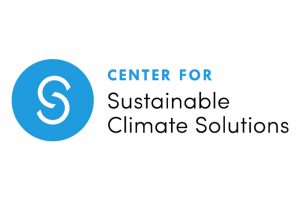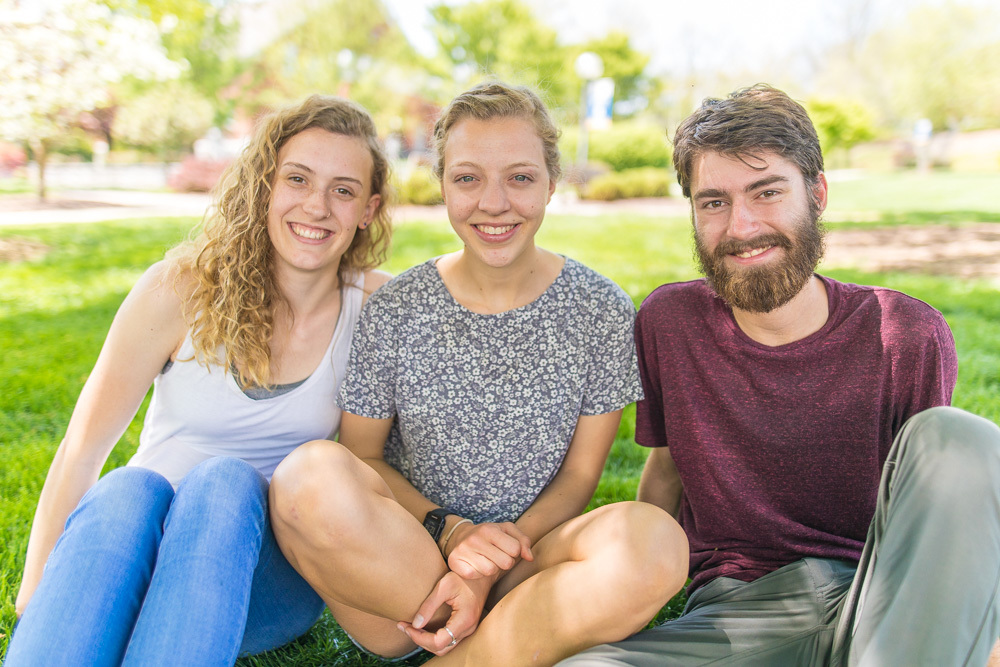Two upcoming seasons of a new podcast and an accompanying website will “rehumanize” the conversation about climate change in churches and beyond.
The Shifting Climates podcast and website will be produced by the Center for Sustainable Climate Solutions (CSCS), a partnership between Eastern Mennonite University, Goshen College and Mennonite Central Committee to advance “thinking and action in Anabaptist and other faith communities to mitigate climate change.”
The podcast and website will be the work of the first CSCS Climate Futures Fellows, all 2018 EMU graduates. Harrison Horst and Michaela Mast will be full-time podcast hosts and Sarah Longenecker will create an interactive website of podcast materials that includes her photography.
Their year-long fellowships will culminate in a presentation at the Mennonite Church USA Convention in Kansas City next July.
They hope their work will “shift the needle” on church conversations about climate change “from somewhere in the middle to more, ‘We need to care about this,’” Horst said.
Each 10-episode season – and each episode – of the podcast will follow a framework based on Climate Change in 10 Words by Tony Leiserowitz: “It’s real. It’s us. It’s bad. Experts agree. There’s hope.” Topics range from Mennonite rituals to the Doctrine of Discovery, and focus on geographic regions such as the Midwest, Appalachia, Southwest, Washington D.C., Harrisonburg and Goshen.
While climate change’s impacts are global, “there are people who are being affected in our country,” Horst said. “Those stories are real, and they’re a little closer to home.”
Climate change, Mast said, is an issue that “connects every single person around this globe in a way that very little else does.” And, Horst said, it can be “a point of revival in terms of restoring our radical Anabaptist legacy.”

“We can’t talk about climate change without talking about our faith, and we can’t talk about our faith without talking about climate change,” he said.
The duo created their first episode last fall for a senior capstone project with the hope of “persistently having good conversations about faith, hope and climate change,” they said. Their interviews with people from different generations and occupations explored climate change’s impacts on people and the relationship between faith and climate change.
In one moment of that episode, podcast guest Malinda Berry, assistant professor of theology and ethics at Anabaptist Mennonite Biblical Seminary, recalled seeing a GreenPeace sticker that said “Save the Whales” – but its owner had “conspicuously crossed out ‘whales’ and changed it to ‘homeless children.’” It was, she observed, evidence of the “kind of either/or” that arises in discussions about the environment, “like people first or everything else in the environment?”
But climate change is not only an “environmental” discussion, Horst said: It’s a human species survival discussion that “should be pushed forward by everyone who cares about the wellbeing of humans on the planet.”
Climate change discussion, Mast followed, is actually about the wholeness of relationships: with God, neighbors, the community, the land and the planet.
“They’re all tied up in one another,” she said.

So thankful for any effort made to discuss, inform and enlighten everyone on this topic that is so important. I lived in Kenya for thirteen years and keep in touch with that part of our world and so much of our planet is impacted by other parts and how we ALL influence the climate. Thanks for what you are trying to do.
Cheers to all of you folks who are working at this. We want to support you in every way possible. This is truly prophetic work! — Earl Martin
I can think of no better way to collaborate with your insights and share them with the larger community! Carry on!
I’m wondering if you have any plans to produce any episodes that include Spanish (or entirely in Spanish). I attend a bilingual church in Norristown PA (Harrison’s birth place if I’m not mistaken). If we are going to use these materials to spark discussion at our church it would be essential for the Spanish speakers to see their connection. The article mentions the global nature of the issue. I can imagine Spanish speaking immigrants being interviewed and connections being made between climate change and their need to emigrate.
How do I reach the podcast? Would love to listen regularly. Thanks